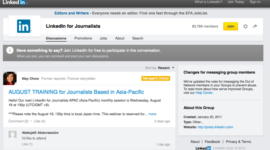Portrait of Venezuela’s Economic Collapse

By Keith Griffith January 3, 2017
In Venezuela, economics has become a matter of life and death. With inflation projected to top 1,600% next year and strict currency controls preventing the import of most basic goods, the country’s oil-dependent economy verges on total collapse. This fall, veteran New Yorker staff writer William Finnegan was dispatched to Venezuela to cover the ongoing economic crisis there. Finnegan recently discussed his experience reporting and writing the piece with Covering Business’s Keith Griffith.
Deciphering the Trump Foundation

By Keith Griffith October 24, 2016
Veteran Washington Post reporter David Fahrenthold spent the better part of a year poring over tax filings, legal records, and conducting hundreds of interviews in an effort to shed light on Donald Trump’s charitable foundation. Fahrenthold spoke with Covering Business’s Keith Griffith about the genesis of his reporting.
Business Journalism Leaps into Virtual Reality

By Gil Shefler October 13, 2016
Virtual reality journalism is rapidly emerging. According to some estimates, the market will be worth $4 billion and capture over 150 million viewers by 2018. Of all the potential areas of coverage, business journalism probably presents the biggest challenge. We offer some tips for beginners and an inside look at how some publications are tackling the new medium.
Trading Your Pen For Podcasting

By Gil Shefler September 22, 2016
Over the past decade, the number of listeners aged 12 and over in the U.S. who tune into a podcast at least once a month has gone from zero to 21 percent. Listeners tend to be young, affluent and well educated—a highly coveted audience for publications to reach. Business podcasts are among the most popular for audiences and more publications are asking their print veterans to take up the mic and translate stories to audio. We offer a few tricks of the trade for journalists starting out.
Protecting Your Source in the Digital Era

By Tiffany Hsu July 18, 2016
Digital conversations over email, text or even the phone are vulnerable to tracking and hacking. And although some beats are more prone to attacks—war coverage, technology, national security, anything investigative—shielding sources is responsible journalistic practice for any reporter. Knight-Bagehot fellow and former Los Angeles Times reporter Tiffany Hsu put together a primer on how to chat safely online in an age of hackers and surveillance.
Green and Clean: How to Cover Renewable Energy

By Tiffany Hsu June 20, 2016
Renewable energy is a beat that’s full of compelling stories for journalists to tell. Tales of prospectors, abandoned projects and risk-taking cowboys abound. But because so much of the technology is new and the subject so heavily politicized, it can be tough to get the real story. Tiffany Hsu, former reporter for the Los Angeles Times and a recent Knight Bagehot fellow, breaks it down for us.
Touring “The Billionaire’s Loophole”

By Kim Gittleson June 6, 2016
In his March 2016 story “The Billionaire’s Loophole,” published jointly by The New Yorker and ProPublica, journalist Alec MacGillis investigates the connection between tax breaks for carried interest—the controversial “loophole” of the title—and the philanthropy of the very rich. Knight Bagehot fellow Kim Gittleson spoke with MacGillis about his reporting and writing process in a Q&A and with annotations to the piece itself.
Digging for Gold on The Golden Generation

By Kim Gittleson May 19, 2016
New Yorker staff writer Jiayang Fan talks with Covering Business about her popular story “The Golden Generation,” in an interview with Kim Gittleson, a 2016 Knight Bagehot fellow. An annotated version of the story itself follows.
Mining Social Media

By Tiffany Hsu May 18, 2016
Dozens of new apps and tools make it easier than ever for journalists to sort and uncover information, data and sources for stories on social media sites like Facebook, Twitter and Instagram. We put together a quick guide.
From Bowie Bonds to Mortgage Loans: A Securitization Primer

By Felipe Ossa April 18, 2016
Eight years after the financial crisis most business journalists still don’t really know how mortgage-backed securities are made. That process, called securitization, plays a big role in not just in mortgage loans but in many other parts of the global economy. Great stories can be hidden behind trends in securitization. Here’s what you should know about how it works.
In Africa, Covering Business the Bloomberg Way

By Jacob Kushner April 5, 2016
Bloomberg believes that the story of Africa’s economic development is woefully under-covered. Two years ago, Michael Bloomberg launched Bloomberg Media Initiative Africa, a $10 million fund to “build media capacity, convene international leaders and improve access to information” on the continent. We spoke to Bloomberg editors to see how it’s going.
The Big Business of Nonprofits

By Marni Usheroff October 15, 2015
Some tax-exempt groups look a lot like for-profit companies. Take the National Football League, which grabbed headlines last year when it announced it would drop its tax-exempt status. NFL teams earned a reported $10 billion in 2013, and had been criticized by lawmakers for raking in revenue while maintaining its tax break. We look at what separates nonprofits from other businesses and how to dig into their finances.
Mining Obamacare for Great Business Stories

By Marni Usheroff September 16, 2015
The Affordable Care Act has reshaped the business landscape, creating new business hurdles and opportunities, alliances and rivalries. We offer five tips on where to look for stories as they unfold.
LinkedIn For Business Reporters

By Jackie Faye August 11, 2015
For business journalists, LinkedIn is so much more than just a professional social media network. It is also a great resource for the reporter tool kit.
Shell Games: Following the Money in High Priced Real Estate

By Jackie Faye June 24, 2015
It took New York Times investigative reporters Louise Story and Stephanie Saul a year to uncover the 200 shell companies behind some of New York’s priciest real estate at the Time Warner Center. We go behind the scenes with Story to discuss their reporting process.
How to Track a Billionaire

By Jackie Faye May 6, 2015
Forbes magazine has been putting together a list that tracks the wealthiest individuals on the planet for 29 years running, and it is no easy task. We interviewed Forbes’ Deputy Editor of Wealth Keren Blankfeld about the work that goes into Forbes’ annual list.
Powerful New Tool for Transnational Crime Beat

By the Editors September 22, 2014
Cross-border crime and corruption have ballooned in recent years, in tandem with globalization. According to United Nations estimates they now generate around $870 billion in profits a year for criminal organizations. These illicit networks are ripe for investigative coverage, and yet, investigative journalists often struggle to cover them.
A Quick Guide to Business and Economics Databases

By Alex Plough June 3, 2014
One perk grad students sometimes miss is free access to a vast number of premium online databases. These often include the same resources that financial professionals pay thousands of dollars a month to use, and learning your way around them can add an extra level of precision and depth to your reporting.
Writing About Corporate Bankruptcy

By Mark Glassman May 19, 2014
Bankruptcy may not be the beat you’ve always dreamed about, but if you approach it the right way, it can yield gripping stories and put you on the map. It can allow you to speak truth to power and give victims a voice
What’s Different About the Tech Beat

By Rob Norton May 5, 2014
Technology is everywhere, and people in the industry are really jazzed about what they do. But you still need to keep your BS detector working.
How to Make Numbers Sing on the Radio

By Nina Gregory April 21, 2014
The old maxim among hosts, editors, reporters and producers is that if you say more than one or two numbers on the air, your listeners will tune out, like bored kids in a math class.
When to Use Anonymous Sources

By Mark Glassman April 7, 2014
Everyone’s uncomfortable with them, but they still yield valuable information that serves the public trust. Here are 6 questions to ask before granting anonymity.
Making Business Journalism Visually Interesting and Accessible

By Roseanne Gerin March 31, 2014
The best news organizations are investing in infographics and other digital tools; those who don’t will be left behind
A Tale of Two IPOs: Why Facebook Got Disliked and Twitter Got Followed

By James Passeri March 24, 2014
Facebook’s initial public offering stumbled, while Twitter’s soared. The reason is all about the remarkable rise of mobile advertising, and its overwhelming importance for social media companies.
